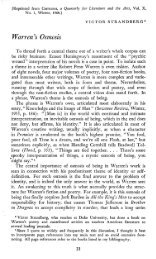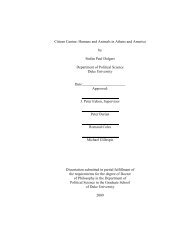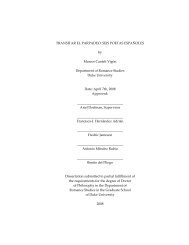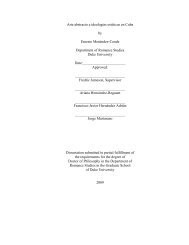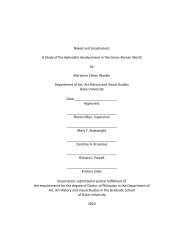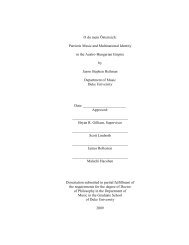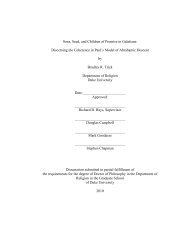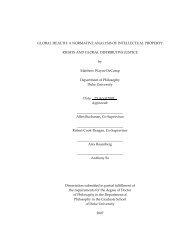View/Open - DukeSpace - Duke University
View/Open - DukeSpace - Duke University
View/Open - DukeSpace - Duke University
Create successful ePaper yourself
Turn your PDF publications into a flip-book with our unique Google optimized e-Paper software.
individuals paranoid of having their homosexuality exposed in fear of social and political<br />
ramifications (van der Werff 2010).<br />
Nevertheless, contemporary attitudes towards gender and sexuality in Chinese society are<br />
rapidly changing (Farrer 2002). At a tongzhi book club event, one participant remarked:<br />
People are now more receptive to the idea that not everybody is meant to be<br />
heterosexual. However, it is frustrating that you can never hear honest discussion<br />
about sexuality in the media. I … look online to learn more about homosexuality<br />
and how to cope with being gay in China… I have tried reading books and articles<br />
in English, but they … do not speak to the experiences of homosexuals in<br />
China… [In contrast,] many Comrade stories can be realistic [and easy to read]…<br />
What draws me to them is … the idea that, through fiction, I can temporarily<br />
forget about who I’m supposed to be to experience different kinds of emotions<br />
and love… Although they are fiction, they give me some insight into how I can<br />
conduct my own homosexuality… [and] the nature of same-sex relations. … It<br />
would be great if everybody read tongzhi stories so that there can be more<br />
tolerance of homosexuality in China (“Discussion1” 2012).<br />
This man’s perspective not only highlights that tongzhi often rely on the internet as a source of<br />
information about homosexuality, but also reveals how Comrade stories provide a voyeuristic<br />
lens through which modern Chinese people review their own lives. To further existing research<br />
on online Comrade Literature, this thesis is organized in three chapters. Each chapter takes up<br />
different aspects related to how private tongzhi desire becomes visible in public space through<br />
gay-themed stories on the Chinese internet: via romance, bildungsroman, and war narrative<br />
structures. The central concern is how online male Comrade stories relate to the wider<br />
framework of hegemonic norms and queer discourse in contemporary China.<br />
The first chapter examines gender performance in tongzhi romance (typically labeled 耽<br />
美 danmei or “Boy Love”/“BL”) narratives. This chapter conducts a close analysis of two online<br />
Comrade stories, “Beijing Story” 《 北 京 故 事 》 (1996) and “The Illusive Mind” 《 迷 思 》<br />
(2003), respectively published before and after homosexuality in China was decriminalized in<br />
1997. The analysis reveals how these texts portray fluid gender relations and identities of male<br />
Introduction | 24



